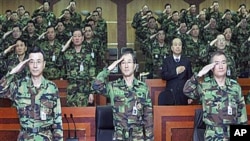The South Korean military is making a New Year's pledge to get practical. The forces have been criticized as being mired in bureaucracy and slow to respond to North Korea's aggressive acts last year.
The new army chief of staff, General Kim Sang-ki, says this year will see a return to combat-oriented field operations units.
The general says to create highly disciplined soldiers ready to face the enemy; the army will train them in realistic maneuvers.
That is in line with President Lee Myung-bak's New Year speech, in which he promised to reform the military to enhance combat readiness.
Park Syung-je at the Asia Strategy Institute says this is all meant to send a message.
Park says South Korea's military is trying to toughen up to signal to North Korea that Seoul is prepared to retaliate strongly in case of further provocation.
Non-combat duties for enlisted personnel are to be streamlined. More officers and non-commissioned officers will be certified in field skills, such as shooting weapons and reading maps. Officers are also being told to drive their own cars, instead of relying on soldiers, who will be shifted to combat units.
New navy personnel are going to have to prove they can stay afloat for more than 10 minutes, rather than merely passing a standard swimming test.
Forty-six South Korean sailors died last year when their ship exploded and sank in the Yellow Sea.
An international investigation concluded the ship was hit by a North Korean torpedo. Pyongyang denies involvement.
The navy on Tuesday said it is deploying additional surveillance aircraft to track North Korean submarines.
The air force says it will begin around-the-clock surveillance to try to provide early warning of any infiltration by the North.
The enhanced military training follows North Korea's shelling of a South Korean island in November. Pyongyang says it attacked in response to South Korean artillery drills in the disputed Yellow Sea.
Two South Korean marines and two civilians died on Yeonpyeong Island.
President Lee and military leaders were criticized for what some South Koreans considered a delayed and weak response to the attack.
Later this week, for the first time, a joint South Korean army and marine exercise will practice repelling a North Korean invasion of five islands near the Yellow Sea border.
North Korea does not recognize the Northern Limit Line in the Yellow Sea, which the United Nations Command drew in 1953 at the conclusion of the Korean War.





